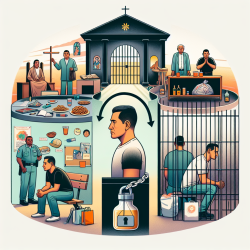Substance use remains a pressing public health concern in the United States, with significant implications for individuals and communities alike. A recent study titled "Religion, Acculturation, and Incarceration: Determinants of Substance Use among Hispanic Adults in the United States" sheds light on the factors influencing substance use within the Hispanic adult population. This blog explores the study's findings and offers practical insights for practitioners seeking to improve their skills and interventions.
The Role of Religion
The study highlights the protective role of religious influence against substance use among Hispanic adults. Individuals who reported that religious beliefs played an important role in their lives were less likely to engage in substance use. This finding underscores the potential of incorporating spirituality or faith-based approaches into prevention programs. Practitioners can encourage clients to explore spiritual or community support systems as part of their recovery journey.
The Impact of Acculturation
Acculturation, or the process of adopting cultural traits from another group, was identified as a significant factor influencing substance use. The study found that less acculturated individuals (those who participated in Spanish-language interviews) had lower odds of substance use. This suggests that maintaining cultural connections and traditions may serve as protective factors. Practitioners should consider culturally sensitive approaches that respect and integrate clients' cultural backgrounds into treatment plans.
The Influence of Incarceration
A history of incarceration was associated with increased likelihood of substance use among Hispanic adults. This finding highlights the need for targeted interventions for individuals with incarceration histories. Practitioners should advocate for comprehensive rehabilitation programs within correctional facilities and support reentry initiatives that address substance use issues. Collaboration with community organizations can help provide resources and support for individuals transitioning back into society.
Practical Strategies for Practitioners
- Cultural Competence: Develop a deep understanding of the cultural dynamics influencing clients' behaviors and tailor interventions accordingly.
- Faith-Based Approaches: Consider incorporating spiritual or religious elements into treatment plans where appropriate.
- Community Engagement: Collaborate with local organizations to provide holistic support systems for clients.
- Advocacy: Work towards policy changes that promote rehabilitation over punitive measures for substance-related offenses.
The findings from this study offer valuable insights into the determinants of substance use among Hispanic adults. By understanding these factors, practitioners can enhance their skills and develop more effective interventions tailored to this population's unique needs.










